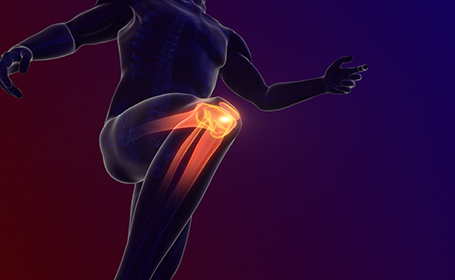
Knee replacement surgery Q&A
We asked three of our leading orthopaedic consultants about knee replacement surgery. They answer key questions on how it works, who it can benefit, and how to weight the risks and benefits
The consultants
- Mr Matthew Bartlett is a consultant orthopaedic surgeon based at The Clementine Churchill Hospital
- Mr Abdel Hassan is a consultant orthopaedic knee surgeon based at The Runnymede Hospital
- Mr Marcus Green is a consultant orthopaedic surgeon based at The Priory Hospital and Sutton Medical Centre
Knee replacements are generally reserved for patients with 'worn out' knees who are in pain.

What kinds of people get total knee replacement surgery? Why do patients typically require this surgery?
Mr Matthew Bartlett: All kinds of people have knee replacement. There is no lower or upper limit on age although we approach younger people with more caution as they are likely to outlive their knee replacement and thus may need one or more revision operations.
The decision to operate is based around the pain and limitation that the knee is causing compared to the improvement a knee replacement would offer.
This is different for each individual - there is no universal answer and careful discussion with your consultant about replacement and its alternatives is always a good idea.
Mr Abdel Hassan: When healthy, joint surfaces are as slippery as ice and we take the mobility for granted.
Patients need replacements of the worn surfaces when the soft cartilage is lost and the joint is painful, stiff and sometimes has become deformed or misshapen.
When non-operative treatment such as physiotherapy, painkillers and anti-inflammatory medications have failed to control the symptoms, we'll suggest surgery.
Mr Marcus Green: Knee replacements are generally reserved for patients with 'worn out' knees who are in pain. The causes of this can vary greatly from injury (trauma) to inflammation (like rheumatoid arthritis).
Surgery is required to relieve pain and improve function in those patients who have lost function because of the disease in the knee.
The age of patient can vary dramatically from young active (apart from the knee) to extremely elderly patients in vulnerable positions who need surgery to maintain their independence.
What are the 5 key stages in getting total knee replacement surgery?

Mr Abdel Hassan:
- Preoperative preparation and education (e.g. dietary advice/weight loss/exercises)
- Preoperative assessment for fitness for surgery and investigations (screening swabs, bloods and X-rays)
- The inpatient care pathway and surgery
- Early rehabilitation and healing
- Maturation of healing
Mr Marcus Green
- Keep as fit as possible prior to the operation. Although the joint may be worn out it is still possible to keep exercising and keep muscle bulk good. If the patient is admitted in good shape the operation and the postoperative recovery is easier and potentially quicker
- Good preoperative counselling highlighting the risks and benefits and setting realistic goals
- Access a surgeon who is performing regular knee replacements - studies suggest that the more you do the better you become as a surgeon
- Be exceedingly diligent with postoperative physiotherapy to regain movement and strength
- If in pain take pain relief and ice the knee to enable good and effective physio to take place

What are the risks involved?
Mr Matthew Bartlett: The major risks are fortunately very uncommon.
Infection worries us most as this can mean having to take the replacement out temporarily in the worst cases. It is, however a very rare complication (much less than 1%) and we take great care with antibiotics, clean air theatres and spacesuits as well as careful wound care to minimise this.
Less unusual (but still uncommon) risks include DVT and significant stiffness (usually due to excessive bleeding in the joint). Dislocation after knee replacement is exceptionally rare as is leg length discrepancy (the leg will be restored to its original length as it is put back into a normal straight alignment).
Mr Abdel Hassan: Risks actively managed include: infection, bleeding and thrombosis.
Surgery is conducted with strict techniques, modern equipment and a special environment dedicated to limit infection risks.
Intraoperative bleeding is usually limited by a cuff round the thigh or tourniquet and sometimes medications. Blood thinning injections or tablets are combined with rapid mobilisation techniques to limit the risk of clots to the legs (deep vein thrombosis) or lungs (pulmonary embolus).
Mr Marcus Green: There are the general risks of having any operation.
Adverse events such as heart attacks and other similar complications are actually quite rare.
Specific risks include infection (approximately 1 in 200), stiffness, deep vein thrombosis, pulmonary emboli and the knee prosthesis coming loose earlier than planned. Problems with the anaesthetic are also recognised.
Infection is the most feared of these complications as it may lead to the knee replacement becoming loose at a much earlier stage than planned. In the worse case the whole knee may require removing and replacing once the infection has been cured.
Patients on average are off work for approximately six weeks, but this can differ significantly depending on the nature of their work.

What is recovery from this surgery like? How much time do patients need to take off work?
Mr Matthew Bartlett: Recovery from knee replacement is difficult and prolonged with about two months off work (this can be longer or shorter depending on the physicality of one's work, commutes etc).
Although we do everything that we can with nerve blocks and painkillers (and some people have a relatively easy time postoperatively) it is not helpful to pretend otherwise as this simply causes a lot of anxiety when the postoperative experience does not measure up to expectations.
Most people are able to get out of hospital within a week but the knee has to be kept bending to prevent stiffness, this stretches the scar and causes pain.
Although generally by about two months most people's knees feel much better than they did before the operation their knees can continue to improve for a year or more afterwards.
Mr Abdel Hassan: Patients are encouraged to mobilise quickly by adopting enhanced recovery techniques.
Typically patients may be stood on the same day, walking the next and manage stairs on the second or third day.
Regular painkillers are prescribed. Patients on average are off work for approximately six weeks, but this can differ significantly depending on the nature of their work.
Mr Marcus Green: The hospital stay should be between three to five days. At the time of discharge the patient should be able to bend his knee to a right angle, be independently mobile with crutches and safe to be discharged.
Avoid driving a car for two to six weeks though if it is the left knee that is replaced driving can start pretty much immediately. Work recommencing between three to twelve weeks depending on the physical nature of the job.
Even the most motivated patient may find that his recovery is considerably longer than he would have anticipated.
The 10 year survival rate for a good modern knee replacement is in the order of 97%.

How long does a knee replacement last? Will it need to be replaced?
Mr Matthew Bartlett: How long replacements last is expressed in terms of survival rather than average lifespan.
This seems a little strange at first sight but as many people will have a knee replacement that lasts the rest of their life it is impossible to say how long that replacement would have gone on if they had lived forever.
The 10-year survival rate for a good modern knee replacement is in the order of 97%.
If knee replacements wear out they can be replaced — this is a more complicated operation, and although it can be redone many times, it does become more difficult each time.
Mr Abdel Hassan: On average, knee replacements last 10-15 years.
Younger patients may thus require more than one joint replacement in their lifetime.
However, being made of modern materials, the longevity is related to how the joint is treated and the quality of the bone to which it is fixed.
Mr Marcus Green: A knee replacement should have a roughly 97% chance of lasting 15 years in the over 60s.
The life expectancy (of the knee replacement) does diminish as the knee replacement is put into a young and more active population.
If a patient undergoes knee replacement surgery between 50 and 55 then the knee may need revising (i.e. redoing) as early as ten years after the initial surgery.
What do you believe are the primary benefits to getting this surgery?
Mr Matthew Bartlett: Relief of pain and restoration of function.
Mr Abdel Hassan: Joint replacement can transform the lives of patients.
It can eradicate severe deformity and 80-90 percent of patients' pain.
This can lead to significant improvements in the quality of patients' lives and help them maintain their independence.
Mr Marcus Green: The major aim should be pain relief — secondarily gains such as function, correction of deformity and mobility are also seen.
Are there any alternatives to this surgery?
Mr Matthew Bartlett: Yes and surgery should not be rushed into - it is rare that delay will cause any problems with replacing the knee in the future and if we think this might be the case the knee can be monitored with X-rays in clinic.
Painkillers, physio, activity modification, weight loss and use of a stick are among the interventions worth trying.
Mr Abdel Hassan: Yes. These non-operative approaches have less risk, but are not as effective as surgery.
Weight loss, exercise, footwear modifications or orthotics to modify the forces passing through the knee, knee braces and injections are just some options.
Mr Marcus Green: Four key points to avoid surgery are: lose weight, do regular exercise to maintain muscle strength, take regular pain relief and try steroid injections to relieve symptoms.
Tags
How do I book an appointment?
If you're concerned about symptoms you're experiencing or require further information on this subject, talk to a GP or see an expert consultant at your local Circle Hospital.